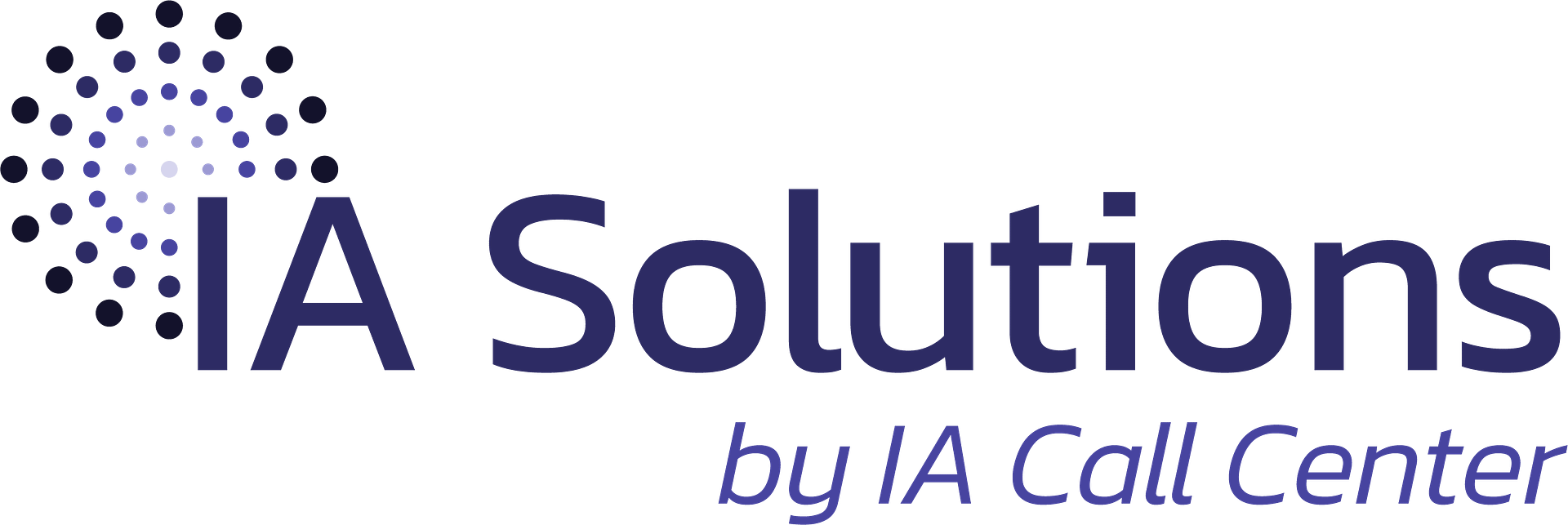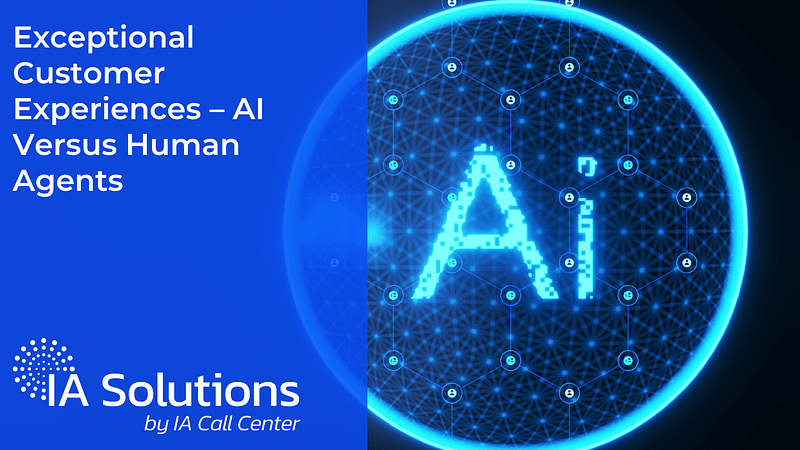Exceptional Customer Experiences – AI Versus Human Agents
Rather listen to the BlogCast for this post instead? Click the red YouTube play button below to hear it now.
Introduction: The AI Versus Human Agents Debate
In today’s fast-paced business world, providing exceptional customer experiences is essential for staying competitive. With the rise of artificial intelligence (AI) and machine learning, many companies are turning to automated systems for customer service tasks. However, the debate between AI versus human agents continues, as both approaches offer advantages. While AI systems are efficient, human agents bring empathy and personalization to interactions that technology can’t match. So, balancing the two is crucial for businesses looking to optimize their customer service strategies and ensure customer loyalty.
This article explores the strengths and limitations of AI and human agents, how to balance the two, and provides guidance for choosing a contact center that enhances customer experience. Companies must decide how they will leverage AI, especially with rising customer expectations for fast yet personal service. The decision to use AI or rely more on human agents affects not only customer satisfaction but also overall business success.
Rise of AI in Customer Service
AI is now an integral part of many businesses’ customer service operations. With advancements in natural language processing and machine learning, AI chatbots and virtual assistants now handle a wide range of tasks, from answering frequently asked questions to processing orders. A 2023 Gartner report states that by 2025, AI will handle 80% of customer service interactions, up from 52% in 2020. AI usage continues to grow because it can dramatically reduce labor costs and enhance operational efficiency.
One of the primary benefits of AI in customer service is its ability to operate 24/7, providing instant responses to customer inquiries. This level of efficiency reduces response times and helps businesses scale their operations without hiring additional staff. Additionally, AI systems can analyze data in real-time to predict and preempt customer needs. However, while AI excels in handling routine tasks, it often struggles with more complex inquiries, highlighting the continued need for human agents to deliver high-quality service.

Value of Empathy in The AI vs. Human Agents Debate
While AI can handle a high volume of customer interactions, human agents bring empathy and personalization that machines cannot replicate. In customer service, especially for high-value clients or complex issues, understanding emotional context is crucial. Human agents can pick up on subtle cues, such as tone and emotion, and adjust their responses accordingly, ensuring that customers feel heard and understood.
A PwC study found that 75% of customers still prefer human interaction for customer service issues, particularly when dealing with a problem. This data reflects the continued importance of emotional intelligence in customer service roles. Human agents offer a tailored experience, building rapport with customers, and resolving issues in ways that AI cannot. Connection on an emotional level fosters customer loyalty, which is a key driver for retention and long-term business success. These personal connections can also turn occasional customers into repeat buyers.
Balancing AI and Human Agents: A Hybrid Approach
In many cases, the key to success lies in adopting a hybrid approach that combines the strengths of both AI and human agents. AI can handle repetitive tasks such as scheduling, FAQs, and initial customer interactions, while human agents handle more complex and emotionally driven issues. This approach allows businesses to improve efficiency without sacrificing the quality of customer care. It also allows businesses to allocate resources more effectively, reserving human agents for tasks that require a personal touch.
A McKinsey study found that businesses using a hybrid model saw a 15% improvement in customer satisfaction and a 20% reduction in operational costs. The hybrid model offers flexibility and scalability, ensuring that customer needs are met quickly without compromising service quality. By leveraging both AI and human agents, businesses can create a seamless customer experience that is efficient, personalized, and responsive to a variety of customer needs. Continual assessment helps companies measure the effectiveness of their hybrid approach.

Common AI Challenges
While AI offers many benefits, it is not without its challenges. A common issue is the inability of AI to fully understand the context of customer inquiries. AI algorithms, despite being sophisticated, can struggle with nuances in language or emotional undertones, leading to frustrating experiences for customers. Often, this results in AI misinterpreting requests or providing solutions that do not fully address the customer’s problem, which leads to dissatisfaction.
Another challenge is the lack of flexibility. Typically, AI systems are programmed to follow specific protocols, meaning they may fail to resolve issues that fall outside of their programming. This often leads to customers being transferred to human agents anyway, which increases wait times and creates frustration. Additionally, AI systems require regular updates and fine-tuning to remain effective, which can be resource intensive. Consequently, understanding the limitations of AI is crucial when deciding how to integrate it into your customer service strategy, ensuring that the system enhances rather than hinders customer experience.
Critical Role of Professional Human Agents
Professional contact centers play an essential role in customer satisfaction. While many businesses adopt AI-driven technologies, contact centers staffed with skilled human agents remain irreplaceable in many scenarios. The personal touch and ability to handle sensitive or intricate customer concerns make these centers a crucial asset for businesses aiming to provide top-tier service. Human agents offer a level of professionalism and experience that is difficult for AI to replicate, particularly in high-stakes industries.
Human-powered contact centers can handle a variety of customer needs, from technical support to sales inquiries. They also provide a scalable solution for businesses, allowing them to focus on growth while outsourcing customer service operations to experts. This expertise can significantly impact a business’s reputation, as positive customer experiences often lead to repeat business and positive reviews. As a result, companies that invest in human-powered contact centers often see an increase in customer satisfaction and overall business success.
Evaluating AI Integration in Contact Centers
When deciding how to integrate AI into customer service, you should carefully evaluate its role. A key consideration is identifying which tasks are best suited for AI and which require human intervention. For example, AI may excel in handling FAQs and routine requests but struggle with customer complaints or emotionally charged situations. Therefore, you should map out customer journeys to determine where AI can offer the most value without disrupting the customer experience.
You should also assess the flexibility of AI systems. Can you customize AI to meet the specific needs of your company? Is there a seamless handoff process between AI and human agents? A successful AI integration requires ongoing monitoring and adjustments to ensure that the system works as intended. By evaluating these factors, your business can make informed decisions about how to use AI effectively within your contact center.

Choosing the Right Contact Center
Selecting the right contact center partner is a strategic decision that will significantly impact customer satisfaction. Therefore, your team should ask several key questions. Does the contact center offer a hybrid model that blends AI and human agents? Are the human agents trained in handling complex or emotional issues, and how often are they updated on new processes or products? These insights help gauge the effectiveness of a contact center in providing personalized customer care.
Additionally, it’s important to ask about scalability. Can the contact center grow with your business, handling increased call volumes without sacrificing quality? Inquire about the technology the center uses and its ability to adapt to changing needs. Finally, inquire about performance metrics. A reliable contact center should provide data on customer satisfaction rates, resolution times, and other key performance indicators that show their ability to meet your needs. Asking these critical questions ensures you select a contact center partner that aligns with their goals.
Conclusion: AI Versus Human Agents – The Future
In the debate of AI versus human agents, there’s no one-size-fits-all solution. And, many successful businesses often adopt a hybrid approach, leveraging the strengths of both AI and human agents to deliver exceptional customer experiences. AI can handle the routine tasks and initial interactions, while human agents resolve issues that require emotional intelligence and a personal touch.
Ultimately, the right balance will depend on the specific needs of your business and your customers. By carefully evaluating the capabilities of both AI and human agents, you can build a customer service strategy that maximizes satisfaction and loyalty. Even as AI technology evolves, human agents will continue to be essential in delivering the nuanced, empathetic service that customers expect.
IA Solutions, Your Professional Boutique Contact Center
IA Solutions is a professional boutique contact center that combines over 50 years of experience with innovative technology. Our team of expert human agents, supported by AI-driven tools, is dedicated to providing exceptional customer service. Contact us at 1-888-631-9711 or email [email protected] to learn how we can help you elevate customer experience.















